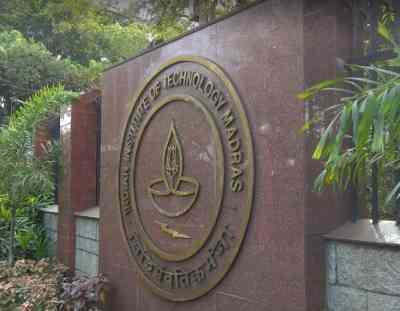IIT Madras, Israeli researchers' aerogel adsorbent to tackle water pollution
Chennai, Oct 30 (IANS) Researchers from Indian Institute of Technology (IIT) Madras and Tel Aviv University in Israel have developed an aerogel adsorbent that can remove trace pollutants from wastewater.

Chennai, Oct 30 (IANS) Researchers from Indian Institute of Technology (IIT) Madras and Tel Aviv University in Israel have developed an aerogel adsorbent that can remove trace pollutants from wastewater.
The graphene-modified silica aerogel removes over 76 per cent of trace pollutants (PPM level) in continuous flow conditions, offering a sustainable path for large-scale water purification, revealed the findings, published in the journal Nature Scientific Reports.
Aerogels, which are incredibly lightweight solids composed mostly of air, are excellent adsorbents (a solid substance used to remove contaminants). In addition, they offer advantages like adjustable surface chemistry, low density, and a highly porous structure.
These materials, often referred to as 'solid air' or 'frozen smoke', can be easily fabricated.
"Indigenous techniques for wastewater purification have become essential not only to combat pollution but also to preserve water quality, protect ecosystems and mitigate health risks associated with contaminated water," said Prof. Rajnish Kumar, Department of Chemical Engineering, IIT Madras, in a statement.
"Conventional wastewater treatment methods struggle to remove trace of pollutants, especially pharmaceuticals. In response, scientists have explored various methods, including adsorption, advanced oxidation processes and membrane filtration. Among these, adsorption is attractive because of its eco-friendly nature, cost-effectiveness, and efficient pollutant removal capabilities," he said.
Thus, the research team developed a silica aerogel modified with graphene (a Nobel-winning form of carbon renowned for its exceptional properties).
The researchers employed a method called 'supercritical fluid deposition' to prepare these modified aerogels and rigorously studied their effectiveness.
The graphene-doped modified silica aerogels (GO-SA) were found to exhibit remarkable efficiency in purifying water, attracting and removing contaminants due to graphene's unique molecular structure which further enhances the available surface area of the aerogel.
Under real-life conditions mimicked in their experiments, the material removed over 85 per cent of pollutants in controlled settings and more than 76 per cent in continuous flow conditions.
"This jointly developed GO-SA aerogel can be customised to target specific contaminants by modifying their surface chemistry, making them versatile. Furthermore, they can be regenerated and reused multiple times, reducing waste and operational costs, making them a sustainable solution for water purification," Prof. Hadas Mamane, School of Mechanical Engineering, Tel Aviv University.



 IANS
IANS 










